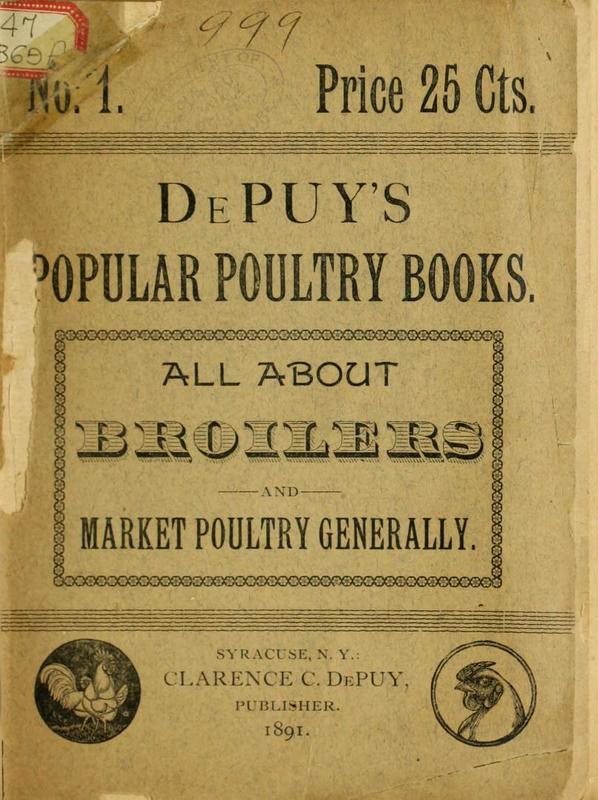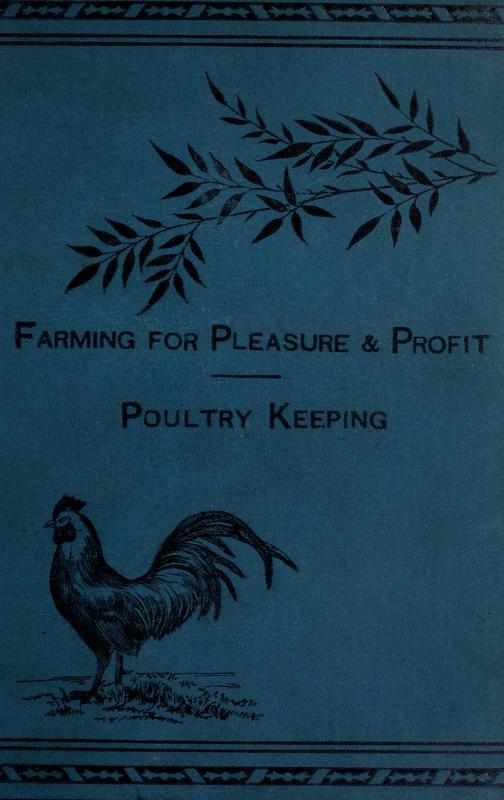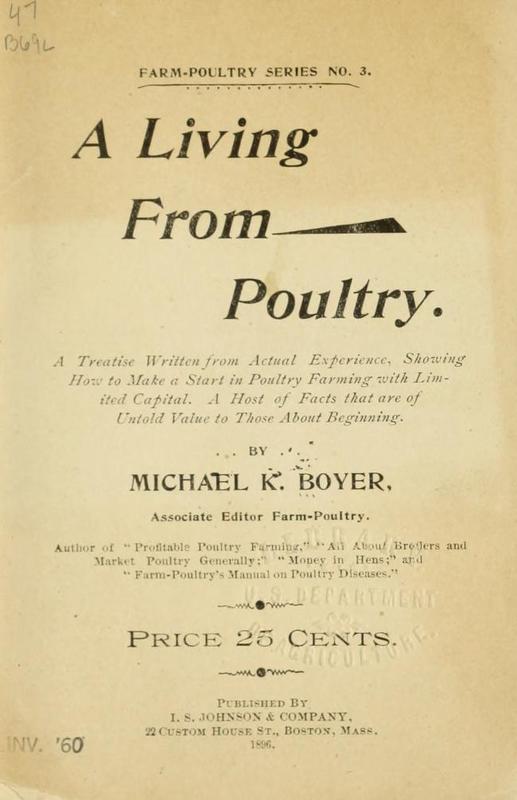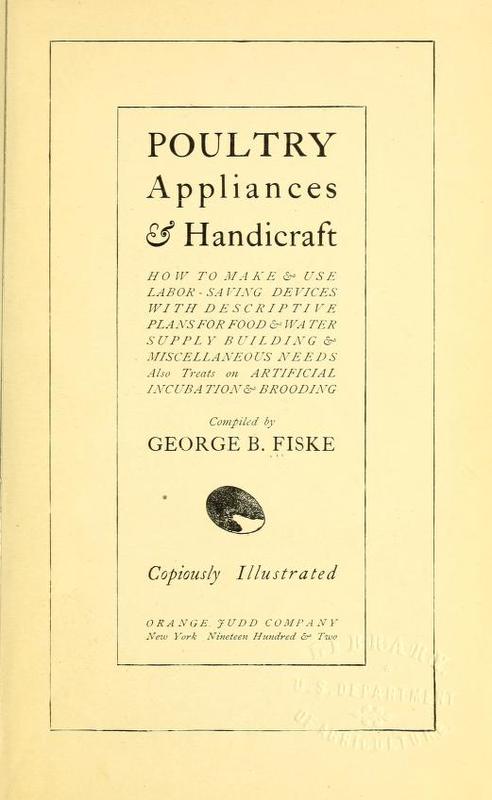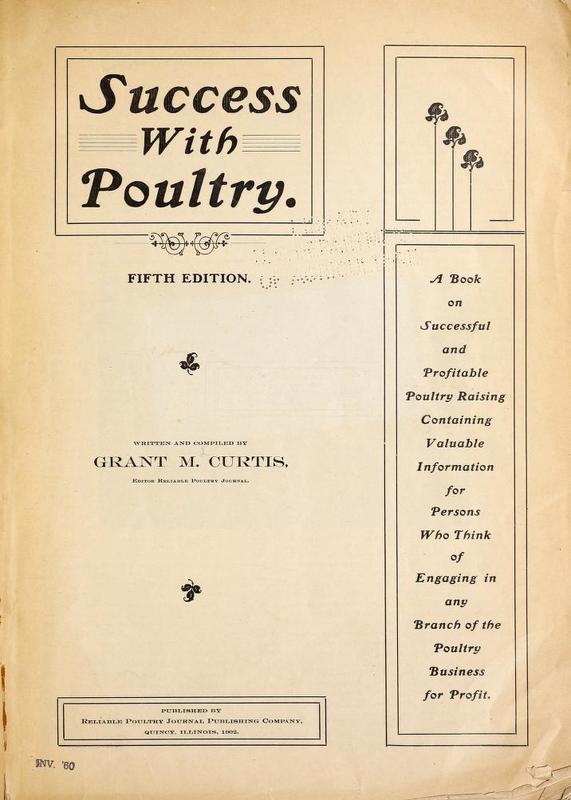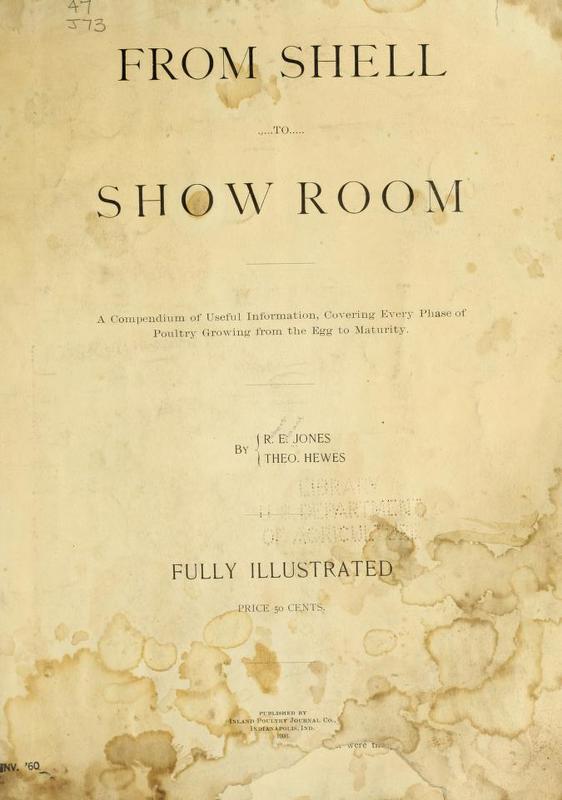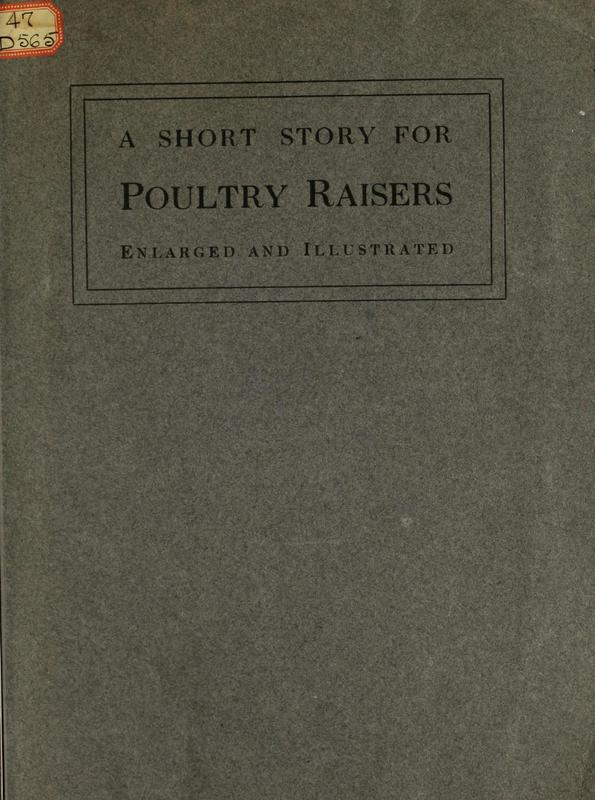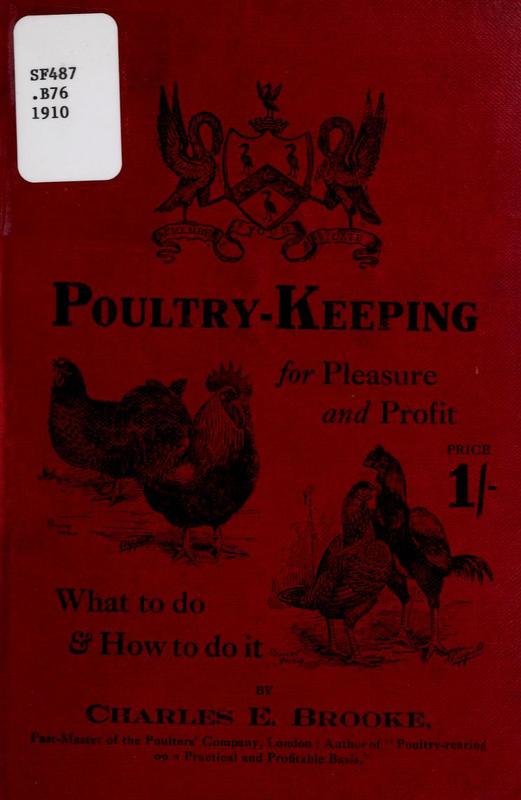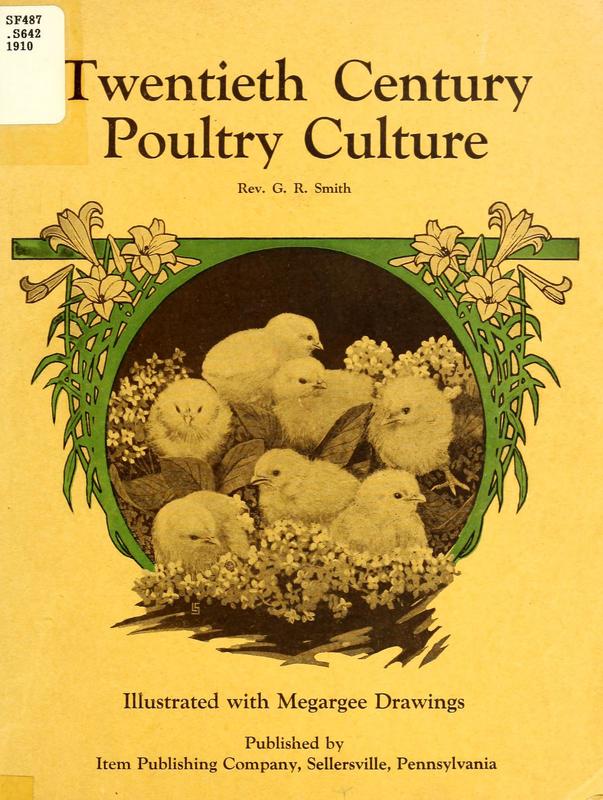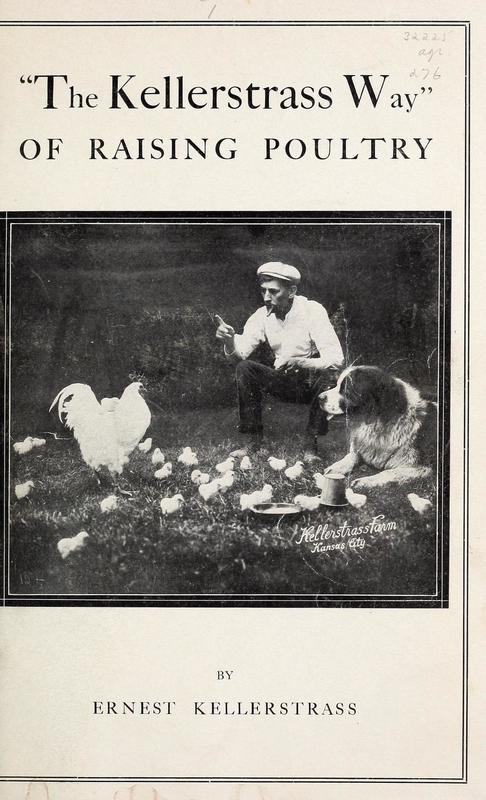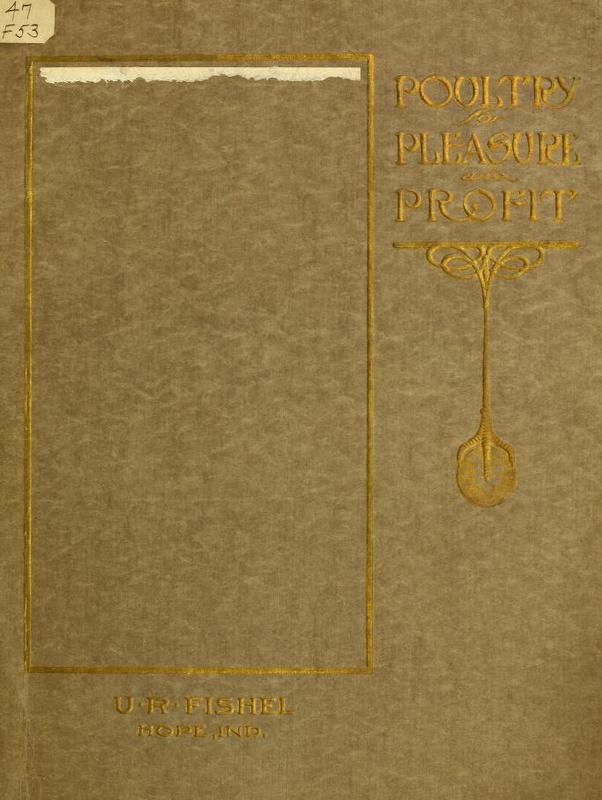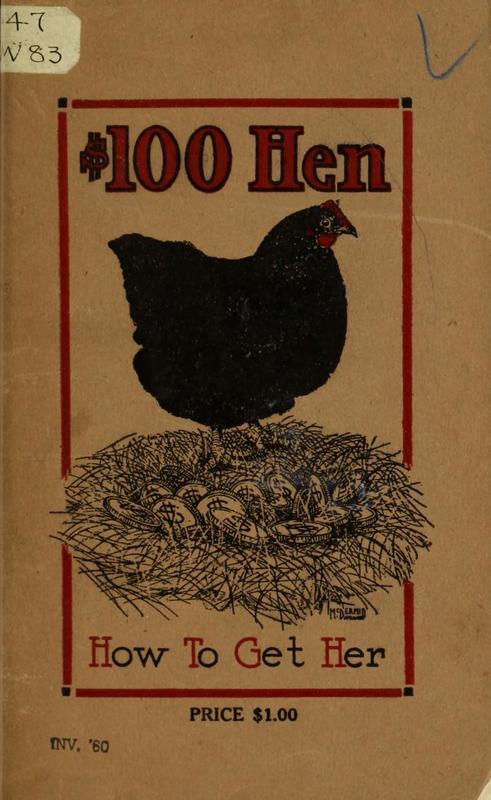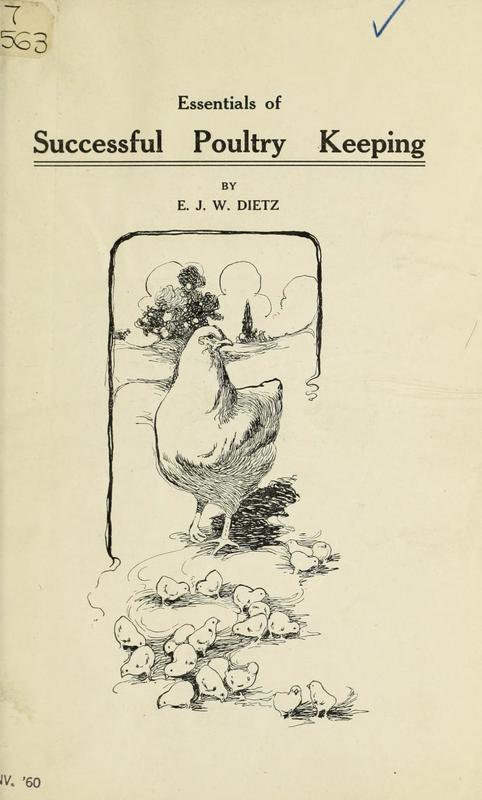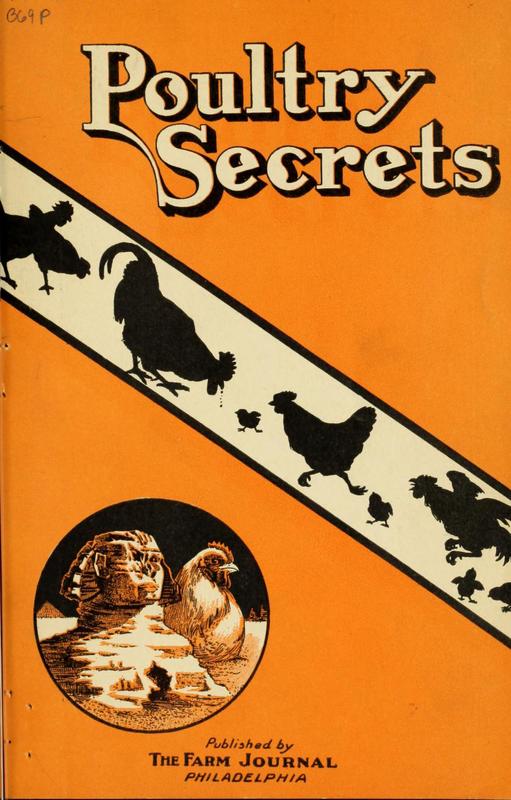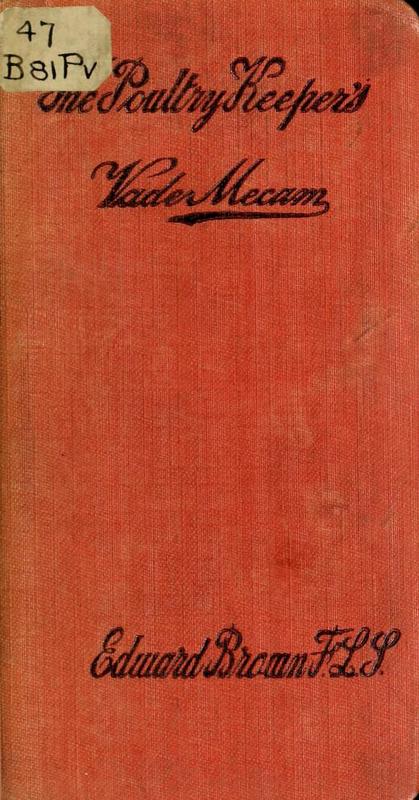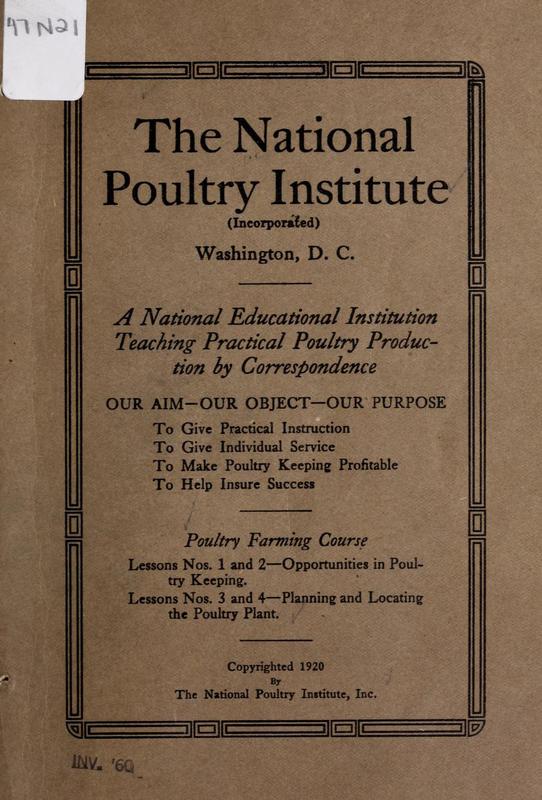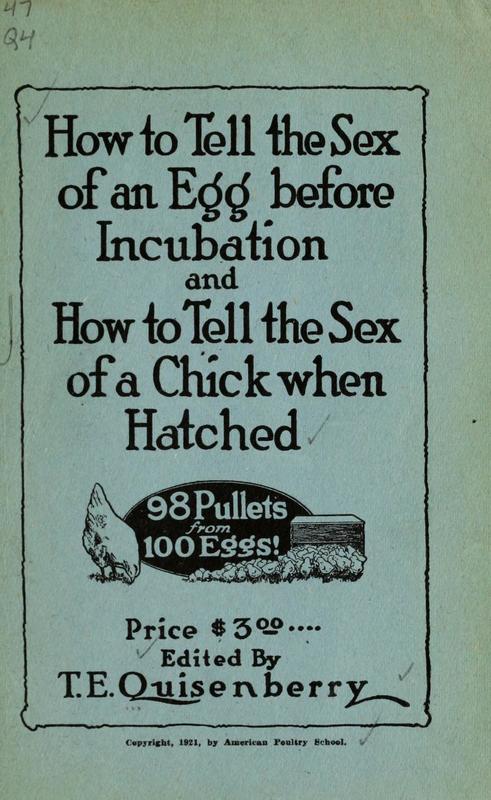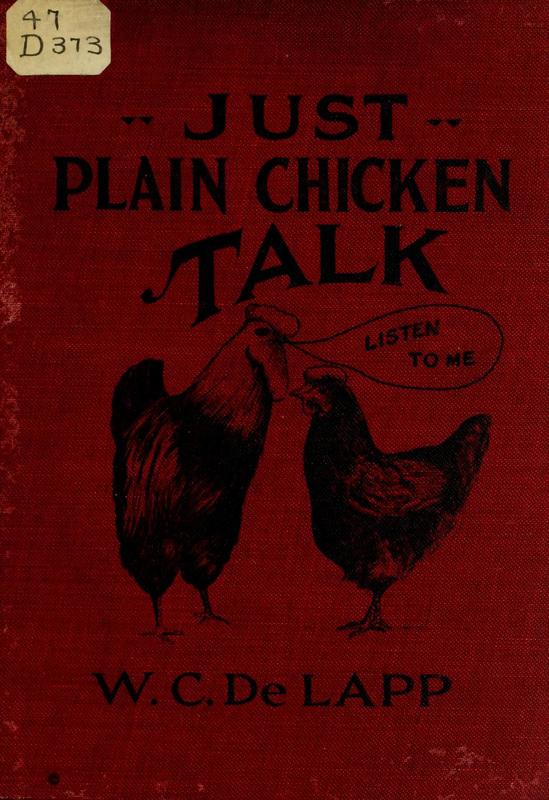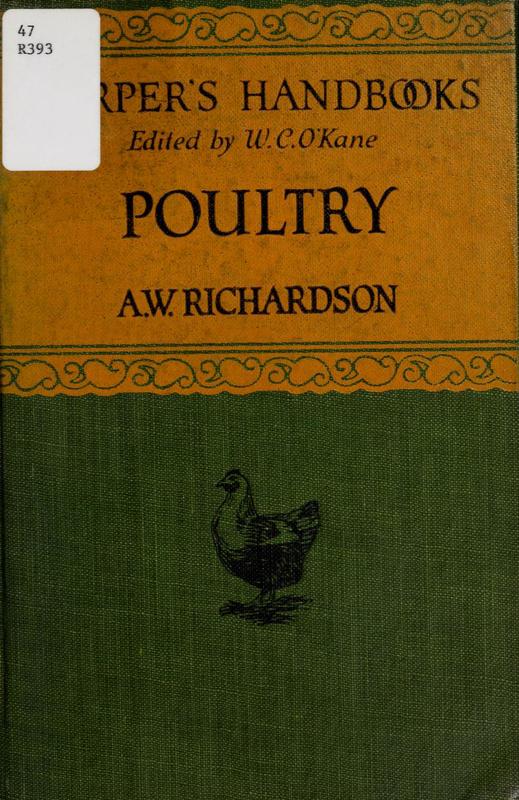Other Books on Poultry Farming
All About Broilers and Market Poultry Generally
Boyer, Michael K., 1891
"In undertaking the task of writing a treatise on broilers and market poultry, it shall be the aim of the writer to overdraw nothing, but to present things in their true light. It is with the object of teaching the novice, and avoiding mistakes so often made by those who take their maiden step into the business, that this book is written.
No theories are used, every line is but the record of the experience of one who has spent considerable time and money in gaining the knowledge; and in the hope that all who read may be benefitted, we beg leave to remain, THE AUTHOR."
Poultry Keeping: For Pleasure and Profit
Roland, Arthur, 1892
"CHAPTER I.
Ancient domesticated Poultry — Ruffs and Reeves — Poultry in the Nine-acre Field — Egg Importations — Poultry- keeping in Towns and Suburban Residences — Hens eating their Eggs — Laying at the best Season — Construction of the Fowl-house — Perches — White-washing — Sheds — Dust-heaps — Height and Size of Houses — Runs — Pining Fowls
CHAPTER II.
Choice of Stock — Spanish Fowls — Minorca — Andalusian — Dorking — The Cochin China — The Malay — Brahma - Pootra — Game Fowls — Hamburg Fowls — Silver-pencilled Hankburgs — Golden-pencilled Hamburgs — Silver-spangled Hamburgs — Golden-spangled Hamburgs — Black Hamburgs — Fowls which are good Sitters — Fowls that exhibit a Disinclination to Sit — Polish Fowls — White-crested Black Polands — Golden-spangled Polands — Silver-spangled Polands"
A Living From Poultry. A Treatise Written From Actual Experience, Showing How to Make a Start in Poultry Farming With Limited Capital. A Host of Facts That Are of Untold Value To Those About Beginning
Boyer, Michael K., 1896
"'Can I make a living with poultry?' is a question that comes as regularly to the editor's desk as the months appear on the calendar.
"Is there a living in poultry? " is but a twin sister to the first inquiry.
The latter question is more easily solved than the former. That a living, and a good living, can be derived from poultry culture, has been proved time and again; but whether 'I can make a living,' depends altogether upon circumstances — in the main what 'I' am composed of.
It is the purpose of the author to state more plainly how a living can be made, what the requirements are for the business, and about -what can be done in starting a plant when the capital is limited — narrowed down to a certain sum."
Poultry Appliances & Handicraft: How to Make & Use Labor-Saving Devices. With Descriptive Plans for Food & Water Supply, Building & Miscellaneous Needs. Also Treats on Artificial Incubation & Brooding
Fiske, George Burnap, 1902
"About one hundred and fifty handy devices are explained and illustrated in this little book. These have been selected for superior merit from a much larger number available. Here skilled poultry keepers from all parts of the country have detailed the favorite short-cuts that have saved them most loss and trouble. Many new ideas have been added, making the whole a collection in a condensed form of the best practice in poultry mechanics and handicraft. The suggestions cover every department and stage of progress, from egg to market, and include all branches and grades of the business. Not every poultryman will need them all, but it is apparent that anyone who keeps chickens, turkeys or waterfowl will find among the number abundant practical hints for decreasing labor, waste and worry."
Success With Poultry: A Book on Successful and Profitable Poultry Raising, Containing Valuable Information for Persons Who Think of Engaging in Any Branch of The Poultry Business for Profit. Fifth Edition
Grant, Curtis M., 1902
"This book is to be compiled in dead earnest. Poultry keeping may be a fad with a limited few but in a vast majority of cases it is a serious matter, a question of bread and butter, of a livelihood, and any book writ-ten or compiled on the subject of Success with Poultry should view the poultry business in this light. We shall not put into this book a single statement nor a bit of advice in which we have not full confidence. We do not wish to misrepresent in the least, or to deceive anybody. We do hope that this book may be the means of helping a large number of people who wish to better their condition in life and are in a position to handle poultry with both pleasure and profit.
We shall put into this book, therefore, only the best information and best advice at our command, doing so with a full understanding of our responsibility."
From Shell to Show Room: A Compendium of Useful Information, Covering Every Phase of Poultry Growing From the Egg to Maturity
Jones, Robert Edward and Herves, Theodore, 1903
"It was this idea of educating the new breeder to a better way of starting in the business, and avoiding the errors which have wrecked the hopes of many inexperienced ones, who started wrong, with no available reference to correct them, that the authors of this book planned a publication of this kind. It is our aim to tell you in a way that is easy to understand how best to succeed, and what you should avoid in order to succeed. If we can do this we shall feel that we have been well repaid for the time and expense necessary for a work of this kind. In our illustrations we have tried to portray the chicks in different stages of development, so that our beginners may have a good general idea as to how they should look from shell to show room."
A Short Story for Poultry Raisers, Enlarged and Illustrated
Dickinson, Rogers, 1905
"This little book is merely suggestive of the great subject of poultry raising, being a collection of a few facts in regard to the principal breeds of poultry raised in this country, the hatching and raising of the chicks, the proper food under different conditions and the most suitable houses and runs. No attempt has been made to give a history of the different breeds and only the popular varieties are described.
To the prospective poultry raiser, whether amateur or professional, we would suggest that good pure stock be bought and raised. Good stock costs no more to raise than mongrels, and is always more valuable, if, for any reason, it becomes necessary to sell. Moreover, from chickens whose antecedents are known, known results will be obtained, whereas no one can tell what will come from mongrels."
Profits in Poultry Keeping Solved: Best Authority on Poultry Raising. Save Labor, Time and Expense. Third Edition
Briggs, Edgar, 1908
"Just a few words in the way of introduction to those who have never heard of me or of my new methods. I was born a poultryman; my father before me bred fancy stock all his life; from a small boy I gathered the eggs, took charge of the poultry, exhibited them at the county shows and had birds of my own. I have bred fancy stock all my life and tried the winter broiler business with fatal results, as hundreds of others have done. This led me to experimenting and also studying nature to see if there was not a way in which they could be raised on a large scale without any loss to speak of. The result is, after ten years of careful experimenting, I have solved the problem and am now able to put any poultry plant on a paying basis, regardless of location or other obstacles, and plants that went out of business under the ordinary methods have started up under my new methods and made wonderful successes."
Twelve Months Work in the Poultry Yard: A Short, Boiled-Down and Up-To-Date Treatise on Practical Poultry Keeping for Busy People
Wittman, William Theodore, 1909
"The contents of this booklet are intended to be, primarily, intensely practical and to teach a method of poultry keeping exactly opposite to that which is 'fussy,' complicated and unnecessarily laborious.
On the other hand, the title "Twelve Months' Work" has been purposely chosen to emphasize the fact that the successful poultryman will find work to do every day of the twelve months in the year. For regularity and attention to small details, all of the time and in season, are the prime factors of success in this business.
Some attempt has also been made to fit the subject matter more particularly to each month in regular sequence."
How to Make Poultry Keeping Pay
Foy, Frank, 1910
"Many times every year those who have done business with me from year to year have asked why I did not write a book telling how to make poultry as profitable as possible. I have always felt that I should wait to do this until I had learned more of the secrets of success with poultry, but I find that if I were to wait until I knew everything that might be learned I would never get a book on the subject written.
After giving the matter considerable thought I concluded that I might be able to write a little book telling how to make money out of poultry and how to avoid the mistakes which wreck the hopes of the beginner so often."
Poultry-Keeping For Pleasure & Profit: What To Do, And How To Do It
Brooke, Charles E., 1910
"I have frequently been asked to give my opinion on poultry-rearing in Great Britain as a means of counteracting, at all events to some extent, our imports. The sum annually paid out of England for poultry and eggs is L8,000,000. In venturing to respond to the invitation thus addressed to me by many who have noticed my successes as an exhibitor of a cross-bred fowl, from pure Indian game and Dorking, a breed which I recommend as the very best for table purposes, I may premise that as an enthusiast in the British cause I have had the fullest opportunities of putting my theories to a test. Some distinctly original experiments were carried on for me some years ago under the direction of my eldest son, at Iville Farm, Baynards, near Horsham, Surrey ; and I think I may fairly claim that the awards given at Birmingham, Barnstaple, Nottingham, Glossop, Guildford, Plymouth, Hanley, Islington, and the Crystal Palace, for pure Indian game and the cross-breed mentioned, entirely justify the utilitarian results of my method of selecting poultry for cross-breeding purposes, with the final object of improving our native supplies."
Twentieth Century Poultry Culture
Smith, Rev. Geoffrey R.; Megaree, Edgar. Illustrator; Stoneburn, F.H. Breed Descriptions, 1910
"The series of articles from the pen of Rev. G. R. Smith is a faithful presentation of information and inspiration that deserves placing in a permanent volume. For many years Mr. Smith has been a leading contributor to the poultry magazines of the country. As the "Poultry Item" was his "first love" there is mutual honor in compiling this knowledge in book form. In this volume are valuable and useful helps to awaken interest and courage to take up poultry culture and other outdoor work with an enthusiasm that only one, who has traveled the road, can inspire.
Accompanying and embellishing this book are the drawings of Edwin Megargee and breed descriptions of F. H. Stoneburn. These features appear in bound form for the first time and are worthy the careful study of the poultry world. The publishers acknowledge their indebtedness to these co-laborers and bespeak a reception of their efforts worthy their high standing in the poultry world.
THE PUBLISHERS."
Western Poultry Book: Tells You What to Do and How to Do It. The Chicken Business From First to Last. With Questions and Answers Relative to Up-To-Date Poultry Culture
Basley, Mrs. A., 1910
"In the hope of helping beginners and Others of my friends in the poultry business, and in response to urgent requests for a book on poultry culture from my pen, I wrote a small volume a year ago. The whole edition was sold in a year, and on account of the interest taken in it and the demand for something more, I have re-written it and added chapters on breeding in line, fireless brooders and other new features in the poultry business.
The book is a synopsis of many chapters of my "Woman's Work in the Poultry Yard" and other talks on poultry, and embodies the personal, practical experiences I have been through myself in many years of pleasant work in the poultry yard. Its object is not necessarily to urge anyone into the business, but to encourage and help beginners and especially newcomers on the Pacific Coast, where conditions differ materially from those in the East and where there is an increasingly large demand for both poultry and eggs; where the poultry business is about as profitable as any that can be undertaken and a good living may be made in the pure air and sunshine by any industrious man or woman."
Poultry Secrets Revealed
Townsend, Charles F., 1911
"In this little book I shall talk to you, so far as possible, the same as I would do if you could drop into my office from time to time. I assume that you are a novice, a beginner, in poultry culture. Therefore if this book falls into the hands of an old breeder he will probably cry out that he finds very little that is new between its covers. Well, what of it? I am not writing for Experience. I am writing for Inexperience. The old breeder can shift for himself. The beginner needs help. And so, if I save one lone reader from loss--from discouragement--I shall feel that I have not labored in vain, and that captious critics, if they appear, may all go hang!"
"The Kellerstrass Way" of Raising Poultry
Kellerstrass, Ernest, 1911
"It has been my constant aim in writing this book to use common sense, and to give the public as much good practical information as I possibly could, and remember, that this book was written by a man who is out working with his chickens every day. It was not written by a man sitting at a desk in the office with a pencil, dreaming of what could be done, and if you ever visit my farm, I hope I will have the pleasure of showing you what we actually do. I have read a good many of the so-called "theory" poultry books, but how many of them were written by men who have actually got a poultry farm, or have ever raised a chicken? No doubt in the way of theory they can give me and you some advice. If you were sick or had appendicitis, would you take the advice of a doctor who had had years of practical experience, or would you take the advice of a doctor who had only read books?"
Poultry for Pleasure and Profit
Fishel, U. R, 1911
"The breeding of poultry presents a better opportunity to combine pleasure and profit than can be found in any other safe and sane occupation. It gives the business man something to divert his attention from the cares of large transactions; the shop worker finds in it a source of pleasant recreation, while it adds to the comforts of his home and reduces his expenses; the professional man can get away from his profession and get in touch with nature while caring for his fowls; the old man who has given into younger hands the larger activities of life can find in poultry something to give him an occupation and prevent him from feeling that life is a dull affair after all his years of endeavor in other fields; the boy whose activities need some safe outlet can be given a flock of poultry and thus be bred to habits of profitable industry while finding amusement with a flock of hens, and saving him from seeking other and much worse things through which to manifest his surplus vitality; the invalid who is not capable of hard work, but feels that he would be glad to have some fixed task to help him pass away the dull hours, will find in the care of poultry exactly what he needs."
Profitable Poultry: Berry’s Golden Rule Poultry Farm
Berry, Mrs. A. A., 1912
"MY DEAR FRIEND: — Now I am going to write a pretty long introduction; but I want to know all the people who have sent for this book and I want you all to know me WELL. Know me well enough to have confidence in me that I will do just what I say I will and give you a good square deal. So I want you to read this through.
The old saying, "Nothing succeeds like success," is especially true in the poultry business, and I do not know of any business that so many succeed so easily or well with as little capital as those engaged in this line of work."
$100 Hen: How to Get Her
Wolvin, Wallace V., 1912
"CONTENTS
Twenty-four cuts of the most popular breeds.
It tells how to erect the best poultry house in use; gives cuts the number of feet of material, cost, etc., etc.
It tells you how to test your eggs so they will hatch, and
gives cuts showing different stages of fertility.
It tells you the effect of altitude on the hen and egg."
Essentials of Successful Poultry Keeping
Dietz, E.J.W., 1912
"Everybody who has followed the development of the poultry interests in this country during the past few years knows that we have made wonderful progress in our knowledge and methods of caring for these profit producing animals.
This work has been taken up and carried on by both state and private parties and the results of these researches have given us a great mass of reading matter which is difficult for the beginner to analize and understand; because the same results have been arrived at in so many different ways."
Poultry Common Sense: A Compendium of Useful Receipts, Formulas and Suggestions for Poultry Raisers, Including Monthly Pen, Egg and Hatching Records For One Year
Trafford, Henry, 1913
"Feeling that a compact, ready reference book comprising useful poultry receipts, formulas, yearly egg record and hints or "short cut" suggestions in poultry culture would be appreciated particularly by amateurs, as well, perhaps by many more experienced in poultry raising, is what prompted us in offering this book to the public.
This book is not intended as a complete guide to poultry raisers, not even covering the whole list or category of essential features and elements of the business but merely a selection of the more important subjects which are briefly and so far as possible comprehensively and practically treated."
Poultry Secrets: Gathered, Tested and Now Disclosed
Boyer, Michael K., 1914
"This work has been prepared by Michael K. Boyer, one of the foremost poultrymen of the United States. In its preparation he has drawn on his own great storehouse of experience, and on those of his many friends who are authorities on poultry. It is packed full of information not generally known to the average poultryman.
Permit us to say, however, that these 'secrets' — like the majority of human secrets! — are probably not secrets to every person. Some people have had things whispered in their ear or have read occasional hints in papers, or perhaps they have paid five or ten dollars to some expert who furnished the information, or possibly they have bought some expensive book that contained one or two little-known facts. And so this so-called secret knowledge has spread, gradually and slowly, among a — so to speak — 'select inner circle' of poultrymen who treasure it more or less carefully. Of course some of the secrets, like different kinds of molasses, have 'leaked' faster than others, and therefore have become better known."
The Poultry Keeper's Vade-Mecum
Brown, Edward, 1921
"No branch of stock-breeding is, or can be, so general as poultry-keeping, which is within the opportunity of almost every section of the community, each carrying out the work in accordance with its immediate conditions. That is certainly the case with fowls, and to a lesser extent with ducks. Geese and turkeys can alone be profitably bred where space is abundant."
Poultry Farming Course: Lessons 1 - 26
National Poultry Institute, 1921
"JUST A WORD BEFORE WE START
YOUR enrollment as a student of The National Poultry Institute signifies that you are interested in poultry keeping and that you desire a complete practical course of instruction. This being your object you have taken a step in the right direction. The course of instruction, in poultry husbandry of the N. P. I. is thoroughly practical and complete in every detail as you will find as you proceed with the course. As a student of this school you will have at your disposal the information and results of years of experience of America's greatest and foremost poultrymen. Our personal service department as well as the officers of the school are at your disposal at all times to help solve your individual problems and conditions, and help you in every possible way to succeed."
How to Tell the Sex of an Egg before Incubation, and How to Tell the Sex of a Chick When Hatched
Quisenberry, T.E. Editor, 1921
"There are many devices and ideas being sold on the market which claim to reveal a method of testing the sex of an egg before incubation, or of a chick as soon as hatched. We have tested practically all of these known methods and have found most of them unreliable.
It is only after testing a method that was discovered by Mrs. Noda Fry, of Missouri, that we felt that there was any dependence to be put in any method of discovering the sex of an egg or of a chick. We tested this method for more than a year, and all the tests that we have made have resulted in our belief that Mrs. Fry's method is really reliable and a great discovery worthy of application and further investigation."
Just Plain Chicken Talk
De Lapp, William Coultas, 1922
"Just plain chicken talk is the title of this book and just a plain everyday poultry man wrote it. The idea of writing a book had never occurred to the author, but after talking and explaining chickens to hundreds of men and women engaged in this particular business he was led at their earnest solicitation to set forth his ideas and the ideas of others with whom he has come in contact. In the following pages the author has simply tried, with no attempt at fine phraseology and detailed theory, to explain what he knows about poultry. This book is based upon practical chicken knowledge by practical people with no attempt to offer any plan or suggestion which cannot be practically carried out."
Poultry
Richardson, Alton Willard, 1922
 An official website of the United States government.
An official website of the United States government.


